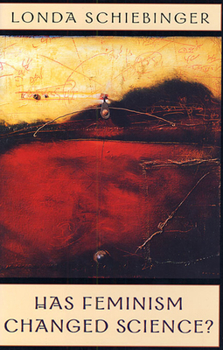Has Feminism Changed Science?
Select Format
Select Condition 
Book Overview
Do women do science differently? And how about feminists--male or female? The answer to this fraught question, carefully set out in this provocative book, will startle and enlighten every faction in the "science wars."
Format:Paperback
Language:English
ISBN:0674005449
ISBN13:9780674005440
Release Date:April 2001
Publisher:Harvard University Press
Length:276 Pages
Weight:0.90 lbs.
Dimensions:0.7" x 6.2" x 9.3"
Customer Reviews
4 ratings
Not the scary post-modernism monster you might think
Published by Thriftbooks.com User , 22 years ago
"Has Feminism Changed Science?" I think the first response to this question is How could it, followed by Why should it? Doesn't this resemble the sort of postmodernist chatter about science that led to the Alan Sokal hoax? Londa Schiebinger's book is not the most interesting in the world, which could raise inaccurate fears that it is cursed with academic jargon. However, her work is valuable in it shows that in fact feminism does have something valuable to say about the development of science. Schiebinger starts off by stating that she does not particularly believe in difference feminism. Nor does she support the idea that stereotypically feminine qualities can provide insights that are unavailable to mere mortal men. She also wisely points out that "It is not obvious that gender has a stronger influence on science than do other political and cultural divides in North American society, such as class or ethnicity." She then starts off with a history of women in science, working on her previous book "The Mind Has No Sex?" and about the somewhat unpleasant consequences of the Enlightenment in the spread of female scientists. The next chapter looks at differences and possible discrimination against women scientists, the possibility of women's indigenous knowledge (mostly in agriculture), and a nuanced and somewhat inconclusive account of publication records and citation counts. The, more interesting, remainder of the book can be divided into two sections: features of the culture of science that unfairly hamper women, and aspects of science that could be improved by looking at gender questions. Schiebinger starts off with how children's toys at a very early age reinforce gender stereotypes, as well as educational software that emphasizes wargame elements more attractive to boys. She discusses widespread images of scientists that assume that they are male. She includes a rather pompous comment by James Watson about his colleague Rosalind Franklin whom he belittled for not being attractive, as well as the fact that F.A. Hayek excluded women from his intellectual salon. She points out that images of science have not always been masculine, while the stereotype of competitive men and cooperative women in reversed in Japan--without improving the status of women. Schiebinger discusses such facts as tone of voice, problems in raising families, the culture of modesty, personal space, as well as one geologist who found herself invited by her department to attend the showing of Sports Illustrated swimsuit video, and being criticized when she demurred. Schiebinger then goes on to study specific studies. She points how many studies in medicine ignored women, such as a 1982 study looking at aspirin and heart disease that studied 22,071 men and 0 women. She also discusses issues in primatology and how female scientists have challenged the masculine assumptions about masculine baboon life. She points out, for instance, that we have no proof that t
An extraordinary document of women in science
Published by Thriftbooks.com User , 24 years ago
The book is one of the best I ever read on the subject of feminism in science. Through history and detailed references Schiebinger analyzes the progress (and the lack of in certain fields) towards a true genderless science. The lack of women in science is viewed as a reflection of not only discrimination, but also social issues, which are rarely addressed. Some of which include primary and secondary education, child rearing and values and equality between spouses at home. The book is a must for anyone interested in the topic!
Outstanding review of the barriers in science
Published by Thriftbooks.com User , 25 years ago
This book is an outstanding review of women in science, the barriers they face and the unique contributions they make. The organization of the text by history, culture, and substance provides the opportunity to look at each of these separately. Schiebinger's documentation and use of contrasting views lends much credibility to her arguments.
This is a wonderful book that challenges our assumptions.
Published by Thriftbooks.com User , 25 years ago
This is a wonderful book that challenges our assumptions as they pertain to science and the workers within science. Schiebinger doesn't define the world as she sees it, rather she utilizes historical, social, and technical patterns to reflect upon the poor success of women in science.





